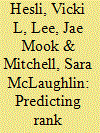|
|
|
Sort Order |
|
|
|
Items / Page
|
|
|
|
|
|
|
| Srl | Item |
| 1 |
ID:
105444


|
|
|
|
|
| Publication |
2011.
|
| Summary/Abstract |
The justification for studying faculty research productivity is that it affects individual advancement and reputation within academe, as well as departmental and institutional prestige (Creamer 1998, iii). Publication records are an important factor in faculty performance evaluations, research grant awards, and promotion and salary decisions. The phrase "publish or perish" encapsulates the importance of research productivity to academic careers. In addition, questions are sometimes raised about whether an individual's status as a minority within academia (e.g., being a member of an underrepresented ethnic or racial group or being female in a male-dominated profession) affects his or her ability to publish or likelihood of publishing (Cole and Zuckerman 1984; Bellas and Toutkoushian 1999). Finally, most previous work that tackles the productivity causality puzzle comes from disciplines other than political science. Thus, one of the purposes of this report is to explore whether the existing findings about research productivity in other disciplines apply equally well to research productivity in political science.
|
|
|
|
|
|
|
|
|
|
|
|
|
|
|
|
| 2 |
ID:
121630


|
|
|
|
|
| Publication |
2013.
|
| Summary/Abstract |
In studying the correlates of job satisfaction among political science faculty we confirm some findings from other disciplines, such as the relationship between institutional type and satisfaction. We demonstrate that those working in top-ranked departments or in private institutions tend to have higher levels of satisfaction with their jobs and with their contributions to the profession. Both job satisfaction and professional satisfaction tend to be highest among full professors; and greater productivity in terms of publishing is independently linked to greater levels of professional satisfaction. In contrast, comparatively higher undergraduate teaching loads undermine professional satisfaction. We also determine that men and women do not differ systematically from one another in their satisfaction levels. We do, however, document significantly lower levels of satisfaction among racial minorities in political science departments. In exploring this finding, we uncover reports of discrimination and dramatic differences in levels of collegiality experienced by different subgroups of faculty members. Experiences with discrimination undermine job satisfaction and are more frequently reported by women than men and are more common among minority faculty than nonminorities.
|
|
|
|
|
|
|
|
|
|
|
|
|
|
|
|
| 3 |
ID:
182625


|
|
|
|
|
| Summary/Abstract |
In this article, we examine the relationship between national pride and political participation in South Korea by considering its unique political and historical backgrounds. Analyzing the Korean General Social Survey (2003–2016), we find that though people with high national pride are more likely to participate than those without high national pride, the effect of national pride is not homogeneous: age and education weaken the relationship, whereas ideological conservatism strengthens it. This suggests that while the conditional effect of age is similar to that in Western countries, education and ideology in South Korea moderate the effect of national pride in a direction different from the West. Therefore, this study implies that though the relationship between national pride and political participation might appear like Western democracies, it reflects idiosyncratic patterns based on the politically unique context of South Korea.
|
|
|
|
|
|
|
|
|
|
|
|
|
|
|
|
| 4 |
ID:
117584


|
|
|
|
|
| Publication |
2012.
|
| Summary/Abstract |
We report the results of hypotheses tests about the effects of several measures of research, teaching, and service on the likelihood of achieving the ranks of associate and full professor. In conducting these tests, we control for institutional and individual background characteristics. We focus our tests on the link between productivity and academic rank and explore whether this relationship reveals a gender dimension. The analyses are based on an APSA-sponsored survey of all faculty members in departments of political science (government, public affairs, and international relations) in the United States.
|
|
|
|
|
|
|
|
|
|
|
|
|
|
|
|
| 5 |
ID:
162611


|
|
|
|
|
| Summary/Abstract |
This study examines the moderating effects of social media use on regionalist voting behavior in South Korea. Analyzing the survey data conducted during the 2017 Korean presidential election, we test how social media functions in electoral processes, particularly with respect to region-based voting in the Korean electorate. The findings of this study reveal that social media use affects region-based voting behavior among the Korean electorate by connecting people with different regional backgrounds in online political communication. That is, social media use can create “bridging” social capital rather than “bonding” social capital in society. In this respect, results differ significantly from findings in the 2012 presidential election. In 2012, only the independent effects of social media existed with a liberal bias, without revealing interaction with regional dummies. These independent effects disappeared in 2017, and different kinds of social media were statistically significant only when they functioned as moderating variables for regional dummies. This implies that as the functions of social media in the Korean election process have evolved in more complexity, they now are able to affect progressive as well as conservative voters.
|
|
|
|
|
|
|
|
|
|
|
|
|
|
|
|
|
|
|
|
|